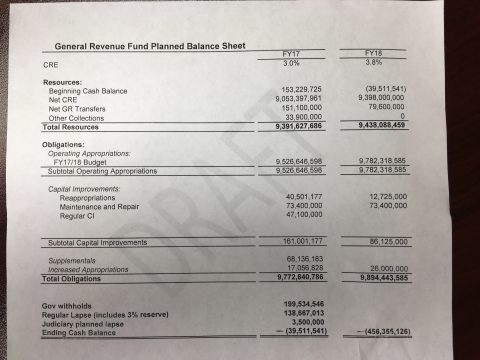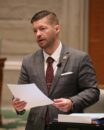JEFFERSON CITY, Mo. – Missouri’s budget has been one of the top concerns for many with the start of the legislative session, and the first meeting of the House budget committee revealed new changes and issues that will have to be handled in a short amount of time.
The House Budget committee features a new chairman in Rep. Scott Fitzpatrick, R-Shell Knob, replacing the termed-out Tom Flanigan, as well as a large number of fresh faces on the committee. This year, the budget committee is making some changes to their rules and processes.

In years past, the committee has consisted of seven sub-committees. Fitzpatrick says those have been consolidated into five committees, and that each member of the House Budget Committee will serve on one appropriations committee.
One of the new things Fitzpatrick wanted to do was to present the committee with his markup, an estimated balance sheet.
“I want to set a new trend here and try to be open about this process and transparent with the committee, as well as the public,” Fitzpatrick said.
The budget is based on a three percent Consensus Revenue Estimate (CRE), agreed to upon by the governor, the Senate and the House. The document shows an estimated $9.3 billion of total resources for the year, down from the General Assembly’s 3.4 percent CRE last year.
Some of the committee members questioned the funding situation of the state, expressing their concerns over tax cuts.
“It’s time for our Assembly to look at the tax cuts. I would be thrilled to reduce taxes for everybody across our state, but it is now hurting the people of our state and it’s hurting our constitutional duty to take care of the welfare of the people in the state of Missouri,” Rep. Deb Lavender, D-St. Louis said. “I think we also need to stop reducing the amount of income that the state is receiving.”
 Fitzpatrick maintains revenues are growing, but the issue is that the budget cannot keep up with the growing number of obligations, estimated to cost the state $9.7 billion. Adding in the withholds from former Gov. Jay Nixon and the regular and judiciary planned lapses to the total resources, what would have been a nearly $400 million shortfall for FY2017 now would appear as a shortage of $39 million.
Fitzpatrick maintains revenues are growing, but the issue is that the budget cannot keep up with the growing number of obligations, estimated to cost the state $9.7 billion. Adding in the withholds from former Gov. Jay Nixon and the regular and judiciary planned lapses to the total resources, what would have been a nearly $400 million shortfall for FY2017 now would appear as a shortage of $39 million.
“Even with the revenue growth, our obligations continue to grow,” Rep. Michael Butler, D-St. Louis, noted. “In your opinion, what, in our obligations, are the biggest areas of growth?”
“If I had to break it down, I’d say we have more of a problem with growing expenses than we do with revenue,” Fitzpatrick responded, saying that the growth in social programs like Medicaid led to some of the issues, as has the increased demands from departments, like the Department of Corrections.
One of the things costing the state money has been the settlements of lawsuits filed against Corrections. The state’s legal expense fund appears on the budget with an “E” placed in for unlimited funds, when the committee does not know how much money to allocate to that particular line item. Fitzpatrick says one of the things they will do is work to remove the “E” from several items in the budget, including that fund.
But much of the work the committee will do this year depends on the actions of Gov. Eric Greitens.
Greitens has previously stated that his State of the State address will not include the budget, as it has under past governors; instead, that will be handled at a later time.
In Thursday’s hearing, Fitzpatrick told the committee that he believes the Greitens’ administration will use the majority of the 30-day-period they’re allowed before handing out the governor’s budget. That would mean the committee wouldn’t see the governor’s proposed budget until late January or early February, giving them less time to work on it before the deadline of the end of session, scheduled for May 5 this year.
“I wish we were going to hear something on our budget,” House Minority Leader Gail McCann Beatty said. “That’s always been one of the priorities; getting the budget started early. We already know we’re not going to hear that, and that’s a problem. Typically we start with the governor’s recommendations, and so we’re not going to have any direction on that. It makes it a little difficult to start working on that.”
“That’s about two weeks later than what we’re used to, so that presents some scheduling challenges,” Fitzpatrick said.
Despite that, Fitzpatrick says he is certain they can pass the budget.
“This is the single constitutional thing we have to do,” he said. “We’ll get it done on time. We’ll do whatever we have to do to meet our constitutional responsibility of passing a budget by May 5th.”
Fitzpatrick says he has been in contact with the governor and his team each week concerning the budget issues since the transition began and expects to continue communicating with them on a regular basis.
For now, they await the governor’s budget, and whatever cuts or restrictions he will make in the coming weeks.
Benjamin Peters was a reporter for The Missouri Times and Missouri Times Magazine and also produced the #MoLeg Podcast. He joined The Missouri Times in 2016 after working as a sports editor and TV news producer in mid-Missouri. Benjamin is a graduate of Missouri State University in Springfield.










